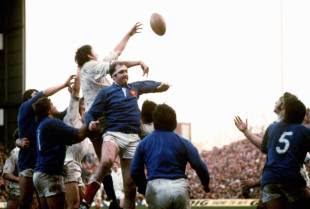The annual rugby-fest of the Six Nations kicked off this weekend. Despite the steady flow of high-level games nowadays – European Champions Cup, Autumn Internationals, World Cups – it remains a highlight of the sporting calendar. It has a rich history, and a distinctive vibe; for the older generations of rugby groovers like me, it used to be the only show in town!
I look back fondly on the days of the old Five Nations (before Italy joined the party). One of my earliest sporting memories of watching England beat France 7-6 on a tiny TV screen when I was about eight – Bill Beaumont jumping for joy at the end, Dusty Hare shaking hands with iconic French flanker Jean Pierre Rives and sidestepping his way back to the changing room past the thousands of supporters streaming onto the pitch at the final whistle. This was the time when the game was still amateur (bar a bit of ‘boot money’ here and there). National teams would convene on a Thursday night, have a few beers, canter through a quick training session on the Friday, before running out in butt-hugging shorts and billowing heavyweight shirts in front of sixty thousand punters and millions watching on the box.
I grew up in France where my Dad worked for UNESCO, and we would get tickets for the Five Nations showdowns through the club I played for. Saturday morning, heading to the simmering cauldron of the old ‘Stadium of Princes’ (Parc Des Princes); I remember the sense of occasion, the noise, the thousands pouring into Paris from the South, with drums, wine pouches and berets, flags and the vivid colours of hundreds of clubs from France’s rugby heartlands. But what I remember most clearly from those days is the match-day programmes. Each player would have a little caption with their height, weight, number of caps, current club and…their job.
Seems strange to think back that all these guys playing at the highest level had some form of full-time employment. Stalwarts of the English pack Wade Dooley and Dean Richards were policemen, legendary Welsh full-back JPR Williams was a doctor, Scottish back row tear-aways John Jeffries and Findlay Calder were both farmers, Maverick Irish fly half Tony Ward was a geography teacher, English winger Rory Underwood was a fighter jet pilot and talismanic French number fifteen Serge Blanco was commercial representative for Pernod Ricard.
OK, fair to say that some the leading players were getting some cash on the side and some used their rugby prowess to boost their professional careers; I recall England open-side Peter Winterbottom going from farmer to international financier when he moved clubs and joined Harlequins. But still, two things occur to me looking back.
Firstly, seems to me there was a refreshing sense of perspective back then – play hard, have a few drinks, back to the day job on Monday morning! The fact that things were so much ‘looser’ and easy-going gave birth to some great stories. Someone was telling me the one about Blackheath‘s favourite son Nick ‘The Munch’ Skinner being called up as a late addition to the England squad for the inaugural World Cup in 1987. The Rugby Football Union (RFU) couldn’t locate him which prompted an appeal from Desmond Lynam live on the BBC’s Grandstand programme for Skinner to get in touch. Nice work, Des!
My other thought is that the benefits of marrying high-level sport with longer-term career plans is very much back on the agenda. Most professional and semi-pro rugby clubs are encouraging players to study, get work experience and think about what they want to do after they’ve finished chasing the egg and knocking seven bells out of each other. Helping with future careers might well become a bigger ‘selling point’ than win bonuses. Even in the modern era, the core rugby values of hard work, respect, humility and teamwork remain. And these are great building blocks for successful careers in most sectors.
Anyways, looking forward to seeing some decent running rugby over the coming weeks, even with the modern-day juggernauts making us purists long for the delicacy and grace of a Didier Codorniou, a JPR, a Tony Ward and an Andy Irvine. I feel fortunate to have experienced the old-school 5 nations era, when rugby players were men at work off the pitch, rather than on the pitch!

